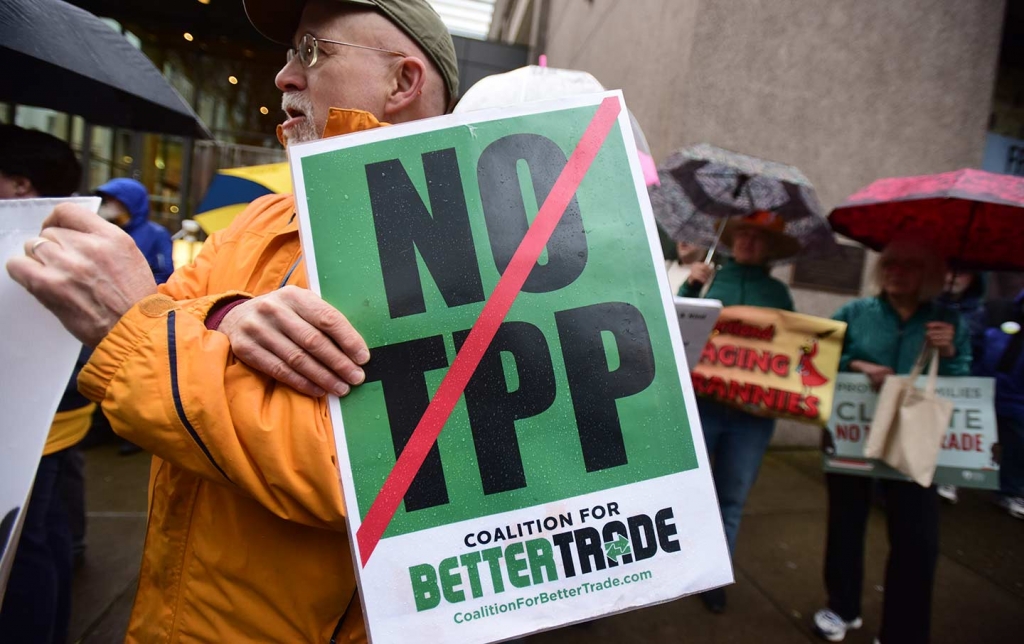-
Tips for becoming a good boxer - November 6, 2020
-
7 expert tips for making your hens night a memorable one - November 6, 2020
-
5 reasons to host your Christmas party on a cruise boat - November 6, 2020
-
What to do when you’re charged with a crime - November 6, 2020
-
Should you get one or multiple dogs? Here’s all you need to know - November 3, 2020
-
A Guide: How to Build Your Very Own Magic Mirror - February 14, 2019
-
Our Top Inspirational Baseball Stars - November 24, 2018
-
Five Tech Tools That Will Help You Turn Your Blog into a Business - November 24, 2018
-
How to Indulge on Vacation without Expanding Your Waist - November 9, 2018
-
5 Strategies for Businesses to Appeal to Today’s Increasingly Mobile-Crazed Customers - November 9, 2018
USA election cycle raises bar for TPP ratification
The U.S. International Trade Commission says the Trans-Pacific Partnership would add slightly to the U.S. economy and create jobs.
Advertisement
If ratified, the 12-nation trade agreement would likely lift U.S. gross domestic product by a small amount – 0.15%, or $42.7 billion, by 2032 – and increase employment by an extra 128,000 full-time jobs, according to the report from the U.S. International Trade Commission. Unfortunately, the TPP labor chapter contains the same ineffectual provisions as in other USA trade agreements and fails to provide effective mechanisms to deal with countries lacking fundamental labor rights, such as Vietnam, Malaysia, Brunei, and Mexico.
U.S. Trade Rep. Michael Froman said the report shows that “TPP will benefit our economy at home and allow the U.S.to help set the rules of the road for trade in the Asia Pacific”. “The services sector would benefit, with a gain of $42.3 billion in output”. Maryland farmer Chip Bowling, president of the National Corn Growers Association, said this report underscores the importance of TPP for America’s farmers and ranchers and called on Congress to pass the agreement this year.
“This report spotlights how damaging the TPP would be for most Americans’ jobs and wages given it concludes 16 out of 25 US economic sectors (in selected sectors in agriculture, manufacturing, and services) would suffer losses while the “upside” projection is miniscule gains in economic growth despite these findings being based on the same widely criticized methodology and unrealistic assumptions that have resulted in past USITC reports systematically overstating the benefits from trade deals that ended up causing serious damage”. For those opposed to the deal – Republican and Democratic presidential front-runners Donald Trump and Hillary Clinton, environmental groups, and a large number of lawmakers from both parties – it’s more evidence that the deal isn’t necessary and should be scrapped.
Earnest said that the White House is pushing for a vote in Congress before the lame-duck session after the November elections. In fact, the US sees the agreement as a way to counter Chinese influence in Asia.
USA real annual income would be $57.3 billion, or 0.23 percent higher with TPP than without it 2032, while the overall US exports would be $27.2 billion higher and imports $42.7 billion higher assuming passage. “For all intents and purposes, the agreement has become the global vehicle for free trade”.
The study found the country’s agriculture and food industries would see the greatest economic benefits under the deal, with their output going up by $10.0 billion, or 0.5 percent by 2032.
Strategists have long recognized the interrelationship between economics and security. The ITC report on TPP came out on Wednesday.
Yet another study, published in January by Tufts University, forecast the TPP would result in a reduction of 0.5% to U.S. GDP over 10 years.
Advertisement
Predictions of growth and income due to trade agreements are hard to make before the deals are implemented, and assessing the actual impact of trade agreements such as the North American Free Trade Agreement is still hard years down the road, economists say. The U.S. trade balance with TPP signatories would improve over 15 years, but the overall U.S. trade deficit is unlikely to change much due to the agreement, the ITC found. The TPP and other NAFTA-style pacts promote offshoring of well-paying US manufacturing jobs, pushing down wages nationwide as trade-displaced workers compete for lower-paying jobs in the service sector that can’t be moved offshore.





























